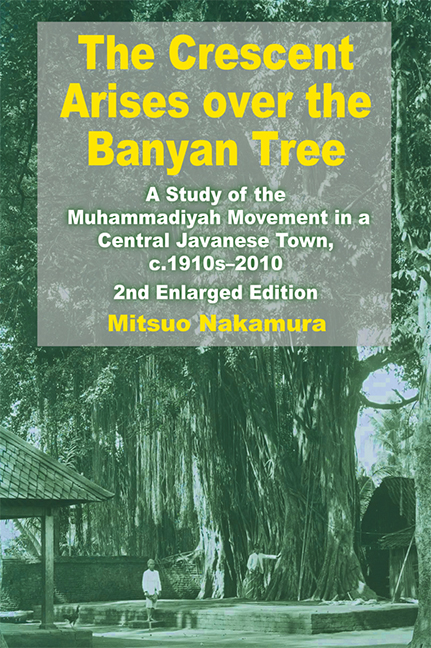 The Crescent Arises over the Banyan Tree
The Crescent Arises over the Banyan Tree Book contents
- Frontmatter
- Dedication
- Epigraph
- Contents
- List of Figures and Maps
- List of Tables
- List of Boxes
- Foreword to the Second Edition
- Preface to the Second Edition
- Foreword to the First Edition
- Preface to the First Edition
- Notes
- Map
- PART I DEVELOPMENT OF THE MUHAMMADIYAH IN KOTAGEDE, c.1910s–1972
- 1 Introduction: The Islamization of Java
- 2 Kotagede under the Banyan Tree: Traditional Society and Religion
- 3 The Beginning of the Muhammadiyah: Court Religious Officials and the Urban Middle Class
- 4 The Development of the Muhammadiyah: Religion and Social Action
- 5 The Sociology of Ummat Islam: Structure and Anti-Structure
- 6 The Ideology of the Muhammadiyah: Tradition and Transformation
- 7 Conclusion: Re-Islamization of Java
- Postscript to Part I
- PART II KOTAGEDE REVISITED, 1972–2010
- Bibliography
- Glossary
- Appendices
- Index
- About the Author
3 - The Beginning of the Muhammadiyah: Court Religious Officials and the Urban Middle Class
from PART I - DEVELOPMENT OF THE MUHAMMADIYAH IN KOTAGEDE, c.1910s–1972
Published online by Cambridge University Press: 21 October 2015
- Frontmatter
- Dedication
- Epigraph
- Contents
- List of Figures and Maps
- List of Tables
- List of Boxes
- Foreword to the Second Edition
- Preface to the Second Edition
- Foreword to the First Edition
- Preface to the First Edition
- Notes
- Map
- PART I DEVELOPMENT OF THE MUHAMMADIYAH IN KOTAGEDE, c.1910s–1972
- 1 Introduction: The Islamization of Java
- 2 Kotagede under the Banyan Tree: Traditional Society and Religion
- 3 The Beginning of the Muhammadiyah: Court Religious Officials and the Urban Middle Class
- 4 The Development of the Muhammadiyah: Religion and Social Action
- 5 The Sociology of Ummat Islam: Structure and Anti-Structure
- 6 The Ideology of the Muhammadiyah: Tradition and Transformation
- 7 Conclusion: Re-Islamization of Java
- Postscript to Part I
- PART II KOTAGEDE REVISITED, 1972–2010
- Bibliography
- Glossary
- Appendices
- Index
- About the Author
Summary
Let there be one group of you who call people to good, who urge them towards virtuous conduct and restrain them from evil deeds. Those are the ones who prosper. (Qur'an 3:104)
ABDI DALEM SANTRI IN KAUMAN, YOGYAKARTA
Serious cleavages were developing not only among the local religious officials in Kotagede but also in the court of the Yogyakarta Sultanate itself around the turn of the century. Some of the religious officials of the court, abdi dalem santri, became critical of the laxity of Islamic faith and practice among their fellow court officials. They urged the ruler and the priyayi to rectify their behaviour according to the standard of Islamic orthodoxy. Kyai Haji (K.H.) Ahmad Dahlan (1868–1923), the founder of Muhammadiyah, was one of these critical santri in the service of the Sultan of Yogyakarta.
K.H. Ahmad Dahlan was one of the twelve ketib (khotib, Friday sermon giver) of the Great Mosque of Yogyakarta, receiving a meagre salary of seven guilders a month from the Sultan's treasury. He lived in the Kauman district of Yogyakarta, gave religious lessons in his own home and engaged in the batik trade, in addition to his official duties in the Sultan's Mosque. He travelled widely in Java for religious as well as commercial purposes. His education was solely religious, obtained from his own father Kyai Haji Abubakar, a ketib himself, and from various teachers (kyai/ulama) in several pondok pesantren in Java. He twice made the pilgrimage to Mecca for a total of several years. K.H. Ahmad Dahlan was not a scholar or a writer. He has left no books or articles. He was, however, obviously an excellent educator and organizer. According to an Indonesian biographer of Dahlan, he was a “manusia amaliah (man of action) rather than a manusia ilmiah (man of scholarship)” (Solichin 1962, p. 28). His religious lessons, given in his own house, attracted a number of Kauman youth. When the Budi Utomo, the organization of young priyayi of nationalist orientation, was established in 1908, he joined it with several of his pupils and associates. He was soon elected to its leadership board as a commissioner and as a religious advisor.
- Type
- Chapter
- Information
- The Crescent Arises over the Banyan TreeA Study of the Muhammadiyah Movement in a Central Javanese Town, c.1910s-2010 (Second Enlarged Edition), pp. 51 - 77Publisher: ISEAS–Yusof Ishak InstitutePrint publication year: 2012
